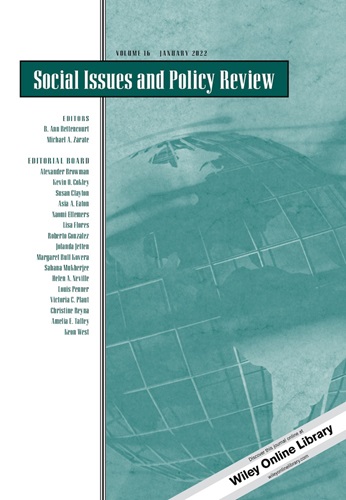用社会心理学解决教育不平等:身份、背景和干预
IF 5.6
1区 心理学
Q1 PSYCHOLOGY, SOCIAL
引用次数: 33
摘要
一些学生群体——通常是那些因社会历史不平等而遭受痛苦的学生——在教育成功方面遇到了不成比例的心理障碍。这些心理障碍——对他们的社会身份的威胁感,以及他们的身份与教育成功不相容的感觉——对群体之间教育结果的不平等做出了重大贡献,甚至超出了经济、历史和结构性的不平等。一系列明智的心理干预措施可以通过针对学生对当地教育背景的主观解释来帮助消除这些障碍。在这篇综述中,我们概述了教育不平等的语境中的身份模型,该模型提出,学生的社会身份和当地教育语境的特征之间的互动——对一个群体的学习成绩的期望,一个群体在与学业成功相关的职位上的表现,以及一个群体对教育的取向——可能会引发社会身份威胁和身份不相容,其方式在不同背景下差异很大。我们提出了一个基于上下文中的身份模型的实施过程,学术研究人员、政策制定者和从业者可以遵循该过程,以帮助他们选择和定制明智的干预措施,有效地减少当地的教育不平等。在整个审查过程中,我们就如何改变教育实践提出了政策建议,以帮助消除表现不佳的学生群体的心理障碍,从而减少教育不平等。一些学生群体——比如一些少数民族或低阶级背景的学生——平均学业成绩要低得多本文章由计算机程序翻译,如有差异,请以英文原文为准。
Tackling Educational Inequalities with Social Psychology: Identities, Contexts, and Interventions
Some groups of students—typically those who have suffered because of historical inequality in society—disproportionately experience psychological barriers to educational success. These psychological barriers—feelings of threat to their social identity and the sense that their identity is incompatible with educational success—make substantial contributions to inequalities in educational outcomes between groups, even beyond economic, historical, and structural inequalities. A range of wise psychological interventions can help remove these barriers by targeting students’ subjective interpretation of their local educational context. In this review, we outline the Identities in Context model of educational inequalities, which proposes that interactions between students’ social identities and features of the local educational context—expectations about a group’s academic performance, a group’s representation in positions associated with academic success, and a group’s orientation towards education—can trigger social identity threat and identity incompatibility in ways that vary considerably across contexts. We present an implementation process, based on the Identities in Context model, that academic researchers, policymakers, and practitioners can follow to help them choose and tailor wise interventions that are effective in reducing educational inequalities in their local context. Throughout the review, we make policy recommendations regarding how educational practices can be altered to help remove psychological barriers for underperforming groups of students and so reduce educational inequalities. Some groups of students—such as some ethnic minorities or those from lower class backgrounds—on average achieve much lower academic grades and
求助全文
通过发布文献求助,成功后即可免费获取论文全文。
去求助
来源期刊

Social Issues and Policy Review
Multiple-
CiteScore
22.20
自引率
1.10%
发文量
9
期刊介绍:
The mission of Social Issues and Policy Review (SIPR) is to provide state of the art and timely theoretical and empirical reviews of topics and programs of research that are directly relevant to understanding and addressing social issues and public policy.Papers will be accessible and relevant to a broad audience and will normally be based on a program of research. Works in SIPR will represent perspectives directly relevant to the psychological study of social issues and public policy. Contributions are expected to be review papers that present a strong scholarly foundation and consider how research and theory can inform social issues and policy or articulate the implication of social issues and public policy for theory and research.
 求助内容:
求助内容: 应助结果提醒方式:
应助结果提醒方式:


